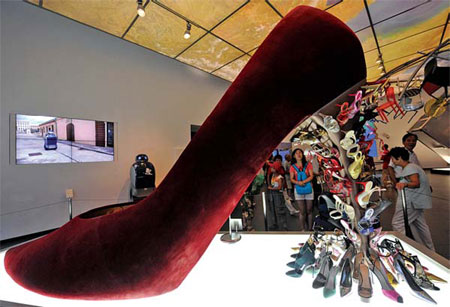Society
'Made in Italy' has prestige in China
By Lu Chang (China Daily)
Updated: 2010-10-05 08:34
 |
Large Medium Small |
|
 A huge shoe model is featured in a display exhibited in September at the Italy Pavilion of Expo 2010 Shanghai. [Xinhua] |
BEIJING - When Fabio Trassarti brought the footwear brand Giovanni Giusti to the Chinese market in 2005 with a single outlet in Beijing, he insisted the labels said Made in Italy to appeal to his Asian clientele.
"It wasn't easy to do business in China when we didn't have any experience working here," said Trassarti, the company's marketing director and designer. "But things started to improve once I realized that Chinese were not looking for something made in China, but something from Italy and changed our marketing strategy, working closely with our distributors.
|
||||
Giovanni Giusti is among the growing number of Italian fashion houses planning to expand in China.
"The Chinese luxury market is in the process of becoming the largest in the world," said Bruno Lannes, a partner in the consulting firm Bain & Company who specializes in the luxury market. "The domestic market, despite the downturn last year, continued to grow 14 percent and we expect growth of 20 to 25 percent in 2010."
In 2009, China's consumption of luxury goods hit $9.4 billion, accounting for 27.5 percent of global luxury sales. China has now surpassed the United States to become the world's second largest market for luxury goods after Japan, according to an annual report by the World Luxury Association.
Versace plans to double the number of its stores in China from 22 to 44 by the end of 2010, Peter Cheung, regional vice-president of communication for Versace Asia Pacific, said in an interview with China Fashion Weekly.
"Despite the global crisis, Versace has maintained a steady growth in sales, especially in China," Cheung said. "China is a very exciting and attractive market for us, but not for manufacturing. We make all Versace products in Italy."
While a lot of companies are motivated to outsource production to save costs and increase profits, Versace sticks to the tradition of 100 percent Made in Italy, Cheung said.
Michael Ouyang, CEO of the World Luxury Association China office, attributed the growth in China's luxury market to the growing ranks of its middle class, who regard luxury brands as a sign of quality of life.
Ouyang said the middle class in China is composed of people who earn over 10,000 yuan ($1,450) a month, who have their own cars and apartments.
But Zhu Mingxia, director of the Research Center for Luxury Goods and Services at the University of International Business and Economics in Beijing, said it's "all about face".
She said Italian brands do especially well in the area of high-end fashion, where the label Made in Italy is a status symbol.
Wang Xin, 24, who works at a public relations firm in Beijing, just bought her second Gucci bag after saving up for three months. She said her purchase involved more than the aesthetic design of the bag and was an investment in her personal image.
"It's necessary for the kind of job I have," Wang said. "When I'm out with clients, a high-end fashion bag or watch is a necessity, because it boosts the image of the company in winning the trust and loyalty of potential clients."
Zhu said China's luxury market is still growing, although the Chinese attitude to luxury consumption has yet to mature compared to many developed countries.



